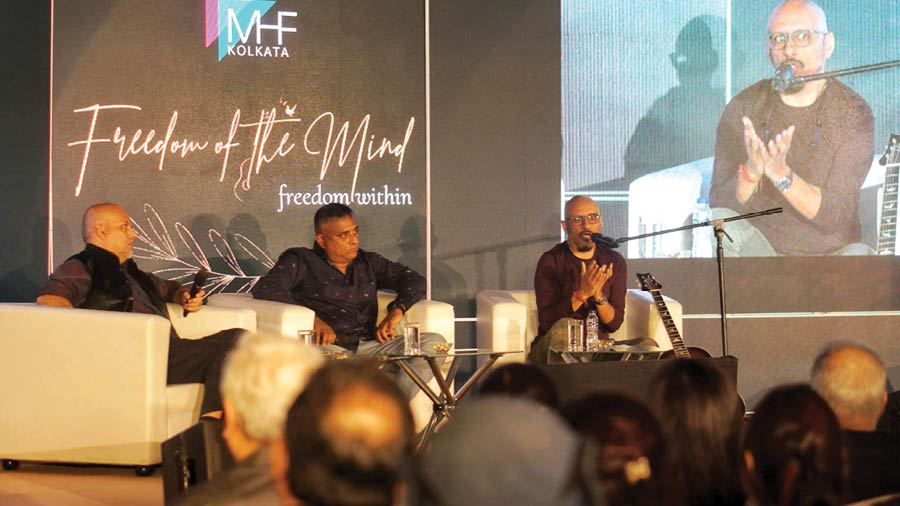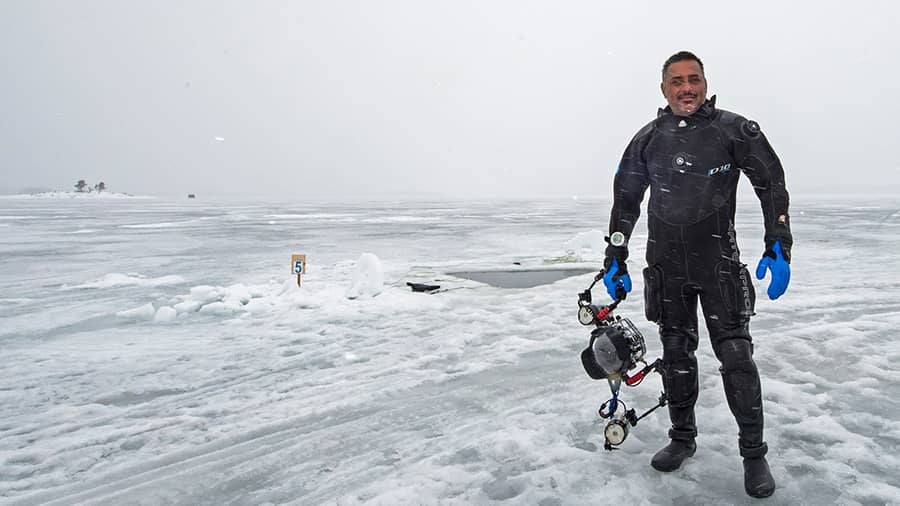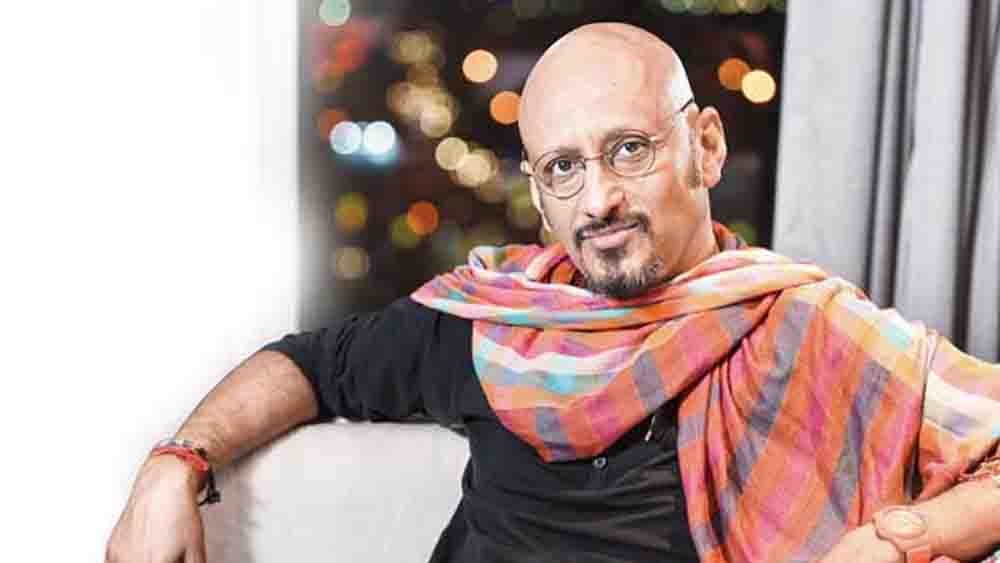“I was there with the most dangerous man in the world at Tso Kar lake (in Ladakh). I had a feeling that I was being strangled in my sleep when I opened my eyes to see Dhritiman [Mukherjee] looking at me. I found that Dhriti’s ‘world-class’ Swiss tents hadn’t worked and that there was ice inside our tent, with the temperature plummeting to minus 20 degrees! He had assured me that the tents would keep us warm and that I could even sleep in my t-shirt. And there we were!” narrated Shantanu Moitra, the award-winning music composer of Parineeta, 3 Idiots and Pink fame. “Actually, there were two parts to that tent, and I had forgotten to carry the outer one. I woke you up to check if you were alive!” shot back Dhritiman Mukherjee, wildlife photographer and conservationist who has been feted within and beyond India, as a packed audience at the Williamson Magor Hall of The Bengal Chamber of Commerce and Industry (BCC&I) lapped up the stories of the two adventurers on December 9.
‘Mental health can’t be seen in isolation’
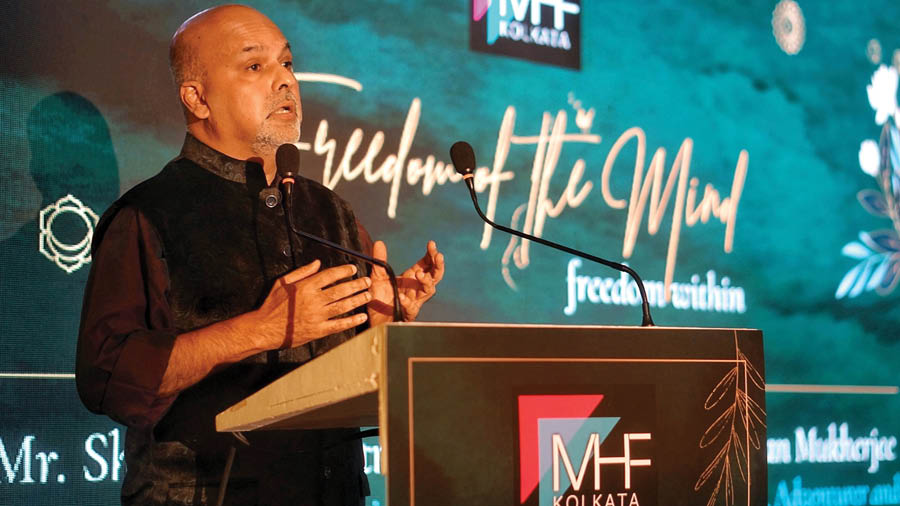
Jai Ranjan Ram delivers the welcome address
Moitra and Mukherjee, who had gone on a 100-day adventure across the Himalayas, from Ladakh to Arunachal Pradesh, in 2016, were invited to BCC&I to shed light on mental health through their respective lenses of music and wildlife photography. The session was organised by Mental Health Foundation (MHF), Kolkata, with the theme for the evening focusing on “Freedom of the Mind, freedom within”. According to the National Mental Health Survey 2019, nearly 56 million people in India suffer from depression while another 38 million experience anxiety disorders. Founded in 2011 by Jai Ranjan Ram and Sreemoyee Sen Ram, MHF comprises multidisciplinary professionals providing evidence-based mental health and social care services.
“We had wanted to do this event in 2021, but then the pandemic happened. I’m glad that we’re finally able to have this evening two years later. Since starting MHF more than a decade back, we’ve expanded to more than 20 members, with a second centre now operational in Kolkata. Our organic growth has been based on uncompromising ethical principles as well as our belief that mental health can’t be seen in isolation. Social and environmental factors also play a significant role in mental health, which is why we prioritise partnering with communities whose voices are often unheard…. When it comes to this evening, though, our goal is to connect the dots among art, nature, environment and mental health,” said Jai Ranjan Ram in his welcome address, before handing over proceedings to Mukherjee.
‘The most dangerous animals are us… human beings’
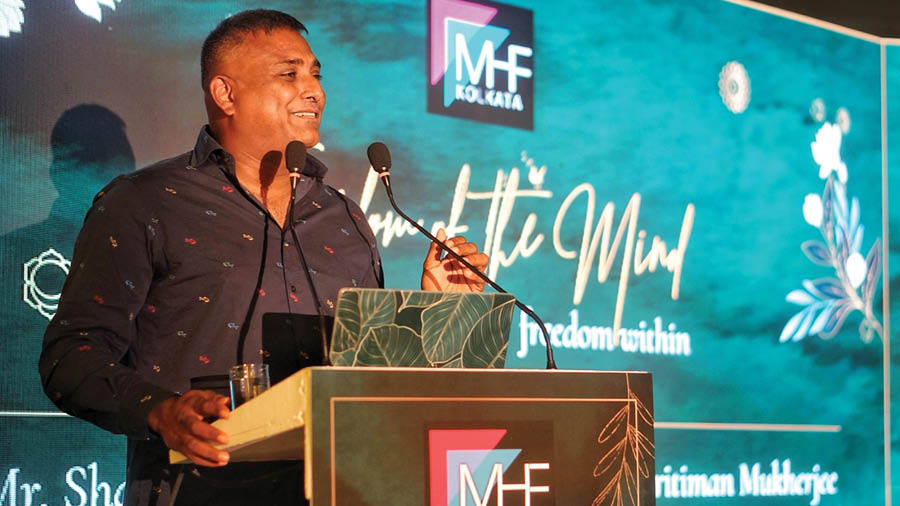
Dhritiman Mukherjee shares lessons from his wildlife adventures with the audience
“I’m more comfortable facing something else, not human beings,” smiled Mukherjee, before showcasing video footage of him capturing some of the most dangerous fish and whales in the world, including the bull shark, the tiger shark, the hammerhead shark and the sperm whale. “The striped marlin almost collided with me before changing direction at the last minute… but nothing happened,” recounted Mukherjee, with a hint of ironic understatement. He jumped from videos of him catching fish to clips of him shooting anacondas, one of which “licked my camera”, before illustrating how he clicked crocodiles from perilously close distances. “The most dangerous animals are us… human beings, not least because we give a bad name to other species, especially through our movies,” noted Mukherjee. “The reason I get so close to the animals is because they’re cool, not because I’m brave. Animals aren’t dangerous, situations are. It’s never man versus wild, it’s always man and wild. There are three things to keep in mind before approaching any species — common sense, a knowledge of the species and the space, and respect for the animal and its surroundings,” added Mukherjee, who discouraged humans from valorising themselves at the expense of animals.
While talking about his experience of climbing 5,400ft to document the eruption of a volcano, Mukherjee underlined how “the focus was on the event, not me. As humans, we frame the situation as overly dramatic so as to show off our superiority”. Mukherjee reiterated his point by sharing a photograph of an elephant charging, which, he said “reveals more about the photographer than the elephant, because the animal was disturbed during the taking of this photo and its private space was invaded”. Segueing to how he has undertaken numerous trips without getting the images he wanted, including waiting for 14 years for the right moment with a brown bear, Mukherjee stated that “for me, there’s no word called failure, because everything contains a lesson…. We’re not here to be the best, we’re here to explore, to find knowledge,” summed up Mukherjee.
‘I have to do more than just entertain people with my music’
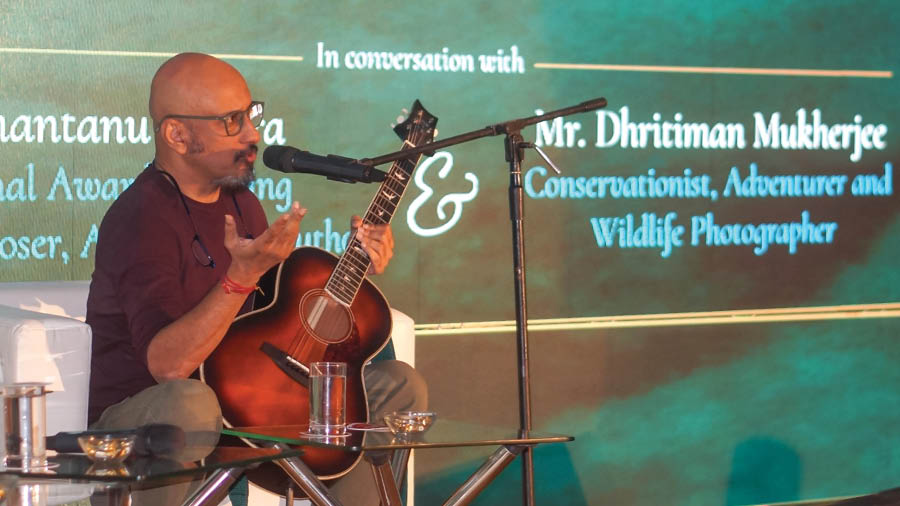
Shantanu Moitra narrates stories from his one-of-a-kind cycling expedition in 2021
It was then time for Moitra to “deconstruct some incidents” in his attempt to fuse mental health and music. Moitra began by recollecting a couple of his personal experiences from his formative years, which taught him that “hard work never goes unnoticed” as well as the importance of knowing that “it’s okay to not know”. Moitra proceeded to discuss the ‘thank you’ tour that the 3 Idiots team had gone on following the success of the film. “We were in Nagpur, where I saw around one lakh people chanting ‘All is Well!’. I felt so powerful. I felt like I was Freddie Mercury…. But I didn’t get any sleep that night, because that very evening I had received a call from a friend who asked me to come to Arunachal as soon as possible,” said Moitra. On reaching Arunachal, Moitra found that his friend had wanted him to document the final performance of three tribal women, all aged between 75 and 80, who were presenting their music for the final time. “These women were part of a 200-year legacy, representing a unique language, a unique music, and a unique culture, all of which would die with them. That’s when I realised that I have to do more than just entertain people with my music. I’ve got to find a way to be a part of something bigger.”
That “something bigger” came calling in 2021, when Moitra, who had lost his father due to Covid-19, embarked on a one-of-a-kind cycling expedition from Gomukh to Gangasagar. In a series of riveting revelations, Moitra spoke about how a deeply personal loss transformed into a collective sense of responsibility when he invited others who had lost their loved ones to the pandemic to send him pictures of their deceased family members. Moitra collected more than 700 such pictures and found an ingenious way to memorialise them, as detailed previously by My Kolkata. During the final leg of his journey, Moitra met with an accident, but persevered, only to realise that he had cycled 19 of the last 20 kilometres of his ride without having any memory of doing so. It was, as if, he had entered a daze, “led on by the belief and the blessings of all those who had contributed to my Ananth Yatra”. “I suppose that’s what is meant by mind over matter. To add to the test, I was stung by a bee in my left eye, but I managed to reach Gangasagar before sunset. I know I couldn’t have done it without the energy of the people whose photographs I was carrying with me,” said Moitra, while performing snippets from two of the songs he had composed during his cycling adventure as part of Songs of the River.
The evening came to an end with Mukherjee and Moitra presenting a curation of images from their 100-day Himalayan experience, followed by a Q/A session with the audience. Speaking about the programme, Sreemoyee Sen Ram said: “This evening’s journey of presentations and interactions made me realise, once more, the need to pause and play the symphony of true connectedness. In our quest for achievement, we have sacrificed stillness. The skilful presentations of Dhritiman Mukherjee and Shantanu Moitra showed us ways to look outward, not just within. They grounded us and reminded us that we’re a part of something much larger than our worries and schedules.”
